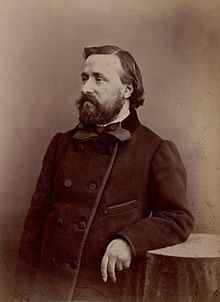Émile Deschanel
Émile Auguste Étienne Martin Deschanel (born November 14, 1819 in Paris , † January 26, 1904 ibid) was a French writer and politician .
Deschanel was a professor in Bourges , later in Paris , but was dismissed in 1850 as a result of his political writing "Catholicisme et socialisme" . Subsequently, Deschanel devoted himself entirely to spreading Republican ideas through the press and appeared often as a speaker . In 1851 he had to flee Paris and lived in exile between 1851 and 1859, including in Brussels, where he gave very popular literary lectures and when he returned to Paris in 1859 he worked for the "Journal des Débats" . In 1876 he became a republican member of the Chamber of Deputies, and in 1881 appointed Professor of Modern Literature at the Collège de France and Senator of the Third French Republic for life. His son Paul Deschanel became a French politician and President of the Third Republic.
Works
- Les courtisanes grecques (Par. 1859)
- History of the conversation (1857)
- Le mal et le bien qu'on a dit des femmes (7th edition 1867)
- La vie des comédiens (1860)
- Causeries de quinzaine (1861)
- Christophe Colomb et Vasco de Gama (1862)
- Physiology des écrivains et des artistes (1864)
- Études sur Aristophane (new edition 1877)
- A bâtons rompus (a collection of moral and literary essays, 1868)
- Le peuple et la bourgeoisie (1881)
- Le romantisme des classiques , 6 vols., Paris 1883–1898, Geneva 1970
- Les Déformations de la langue française , Paris 1897 (5 editions until 1911)
| personal data | |
|---|---|
| SURNAME | Deschanel, Émile |
| ALTERNATIVE NAMES | Deschanel, Émile Auguste Étienne Martin (full name) |
| BRIEF DESCRIPTION | French writer and politician |
| DATE OF BIRTH | November 14, 1819 |
| PLACE OF BIRTH | Paris |
| DATE OF DEATH | January 26, 1904 |
| Place of death | Paris |
